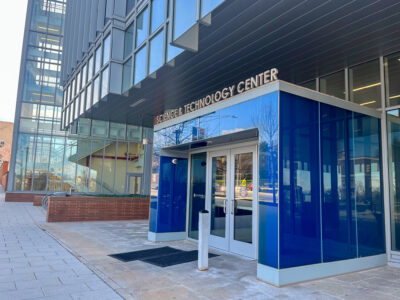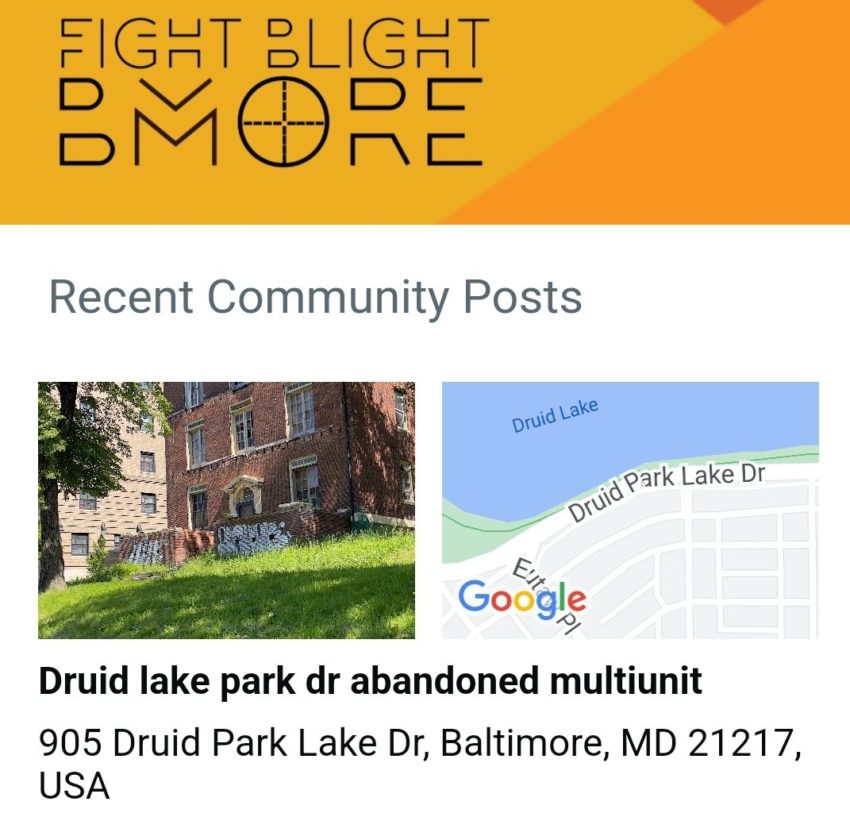
This editorial article is a part of Racial Equity in Tech Month 2022 of Technical.ly's editorial calendar. This month’s theme is underwritten by Spotify. This story was independently reported and not reviewed by Spotify before publication.
Nneka N’namdi recalled a moment in 2016 — well before the recent launch of her housing organization’s app — when she saw kids navigating an ungated demolition site comprising of four brownstones on West Baltimore’s Fremont Avenue.
There were no protective barriers or signage warning about the giant holes on the street where the basements use to be. She imagined all the ways it could go wrong.
What if the kids fell into a hole, or cut themselves playing in the debris and got tetanus? Why was this happening here when, if this were instead taking place downtown, she could guarantee a safe demolition with gates and signs identifying who was responsible for the area? All these thoughts led her to ask other questions: Why are there over 15,600 vacant properties in Baltimore, and why is demolition the go-to solution?
In the end, she ultimately wanted to answer how to stabilize housing outcomes in the city. In trying to answer that, she came up against a familiar hurdle: a lack of numbers.
“We’re saying what we need and what we want, but because we live in a data-driven society, we often didn’t have the data to back it up,” N’namdi explained to Technical.ly about what happened once she started getting into housing- and blighted communities-focused advocacy work. “I watched people get poo-pooed. I watched people have data presented in ways that pathologized Black people and the way that Black people live. I’m like, nah. We’re not about to do that.”
N’namdi decided to use her skills, built over 22 years working as a systems and software engineer who developed websites and other products for clients like Lockheed Martin and government agencies, to develop something better. That’s how she created Fight Blight Bmore (FBB), the name for which came together during her participation in the participating in the Kaiser Permanente Social Innovation Challenge. Although it doesn’t necessarily take long to create an app, when N’namdi wanted to launch one, she needed until February 2022 to launch its beta because she wanted to ensure it worked for the community — and not against it.
The FBB app identifies, reports, tracks, and analyzes blighted properties throughout the city. It was built to be more user-friendly than Baltimore’s 311 system, which operates via Salesforce. FBB app users can tag visible hazards using pictures or videos and follow reports of blight by bookmarking specific properties.
The goal is for residents and communities to use the app for mapping blight in their neighborhoods, as well as track if those issues have been addressed. The data gathered is meant to support advocacy for the community development the neighborhood actually wants, instead of being weaponized against residents. In the coming months, N’namdi plans to develop blight maps with community organizers and local interns. The data can also be used to produce infographics like this:

FBB’s infographic detailing citywide blight and government resources. (Courtesy image)
The app is currently available in its beta version on Google Play and the Apple Store. The organization is also offering an $1000 stipend for community surveyors to collect data on blight in neighborhoods. N’namdi anticipates that the app, along with other products FBB plans to implement, will fundamentally change how the city looks at vacant properties and deterioration.
“The app is a part of a set of tools that we are deploying that will render blight obsolete,” she said. “Concentrations of vacant properties — of abandoned, misused, underutilized properties — will not exist in Baltimore 10 years from now. That’s my goal. I don’t want to be still working on blight issues ten years from now. I’m not interested in the cyclical nature of how traditional nonprofits function. That’s why we have a for-profit and nonprofit arm, as well.”
Donte Kirby is a 2020-2022 corps member for Report for America, an initiative of The Groundtruth Project that pairs young journalists with local newsrooms. This position is supported by the Robert W. Deutsch Foundation.Join the conversation!
Find news, events, jobs and people who share your interests on Technical.ly's open community Slack

Baltimore daily roundup: Real estate deal in the Peninsula; Missing $100M nitrile glove factory; Dirt bike clampdown

Baltimore daily roundup: Gen AI's software dev skills; UpSurge Tech Ecosystem Report; MD service year program

Baltimore daily roundup: Mayoral candidates talk tech and biz; a guide to greentech vocabulary; a Dutch delegation's visit


